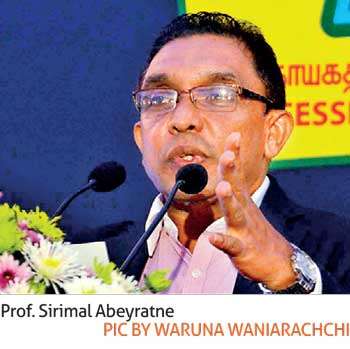07 Dec 2018 - {{hitsCtrl.values.hits}}
 By Nishel Fernando
By Nishel Fernando
The ongoing political turmoil in the country has created “irreversible serious economic consequences” for Sri Lanka for years to come, particularly damaging the foreign investor sentiment, which would ultimately result in limiting foreign capital inflows to the country, a senior economist in the country said.
“Even if the country is able to resolve the political crisis within a week or month, the echoes or impact of unfortunate political turmoil will last for years,” Senior Professor in Economics at the University of Colombo, Prof. Sirimal Abeyratne said.
He made these remarks on Wednesday, attending a seminar organised by Professionals for Democracy in Colombo.
Prof. Abeyratne pointed out that the political turmoil, triggered by the sacking of Prime Minister Ranil Wickremesinghe by President Maithripala Sirisena and appointing the former President Mahinda Rajapaksa as the new Prime Minister, has been disastrous to the Sri Lanka’s already fragile economy.
He said the damage is “complex, massive and cannot be measured,” that will be felt by Sri Lankans across the country in coming years.
He emphasised that the downgrade of Sri Lanka’s sovereign credit rating by all three major international credit rating agencies on the political crisis not only has weakened Sri Lanka’s borrowing ability, but has also sent a negative message to foreign investors.
“It doesn’t matter whether these rating downgrades took place based on actual facts or not; what’s important is the impact of it—the message sent to foreign investors.
“Even an investor who had the slightest anticipation of investing in Sri Lanka, would now change his or her mind,” he said.
Prof. Abeyratne noted that the government in power before October 26 was in the process of implementing a series of necessary economic reforms gearing to service Sri Lanka’s record external debt, next year, and that has come to a halt following the crisis.
He said that the Central Bank is also stuck in a dilemma in defending the rupee and building buffers to meet external debt servicing next year, with current limited foreign reserves of little over US $7 billion.
He stated that foreign exchange inflows from tourism has also been limited due to the political turmoil, which erupted in the peak tourism season, while Japan and United States (US) also have pulled back concessional loans and grants.
Prof. Abeyratne also lamented certain decisions taken by the new Cabinet and the Prime Minister appointed by President Sirisena.
“Various developments have unfolded over the past couple of weeks including the removal of the fuel pricing formula, various subsidies, and changes in taxes. These things should have taken place according to a long-term economic vision.”
He noted that these decisions would further expand the budget deficit, hence increasing the country’s debt burden.
Prof. Abeyratne averred that Sri Lanka needs to focus on boosting exports to stabilise the rupee, which has been neglected over the years.
“Our exports haven’t grown. In 2004, Sri Lanka and Bangladesh had similar export levels—both countries exported around US $7 billion worth of goods and services. However, we are still exporting only US $ 15 billion worth merchandise and services while Bangladesh is exporting US $38 billion worth of goods and services,” he pointed out.
16 Nov 2024 2 hours ago
16 Nov 2024 4 hours ago
16 Nov 2024 5 hours ago
16 Nov 2024 6 hours ago
16 Nov 2024 6 hours ago